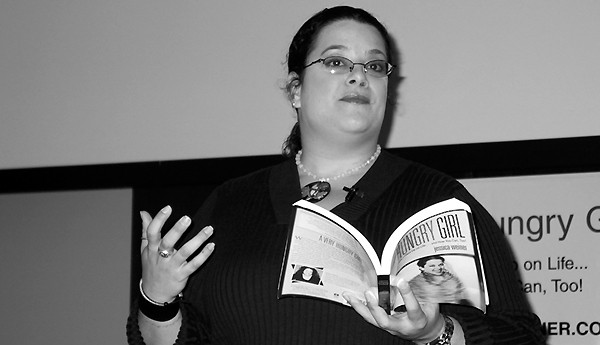
Eating disorder victim shares inspiring tale
Fat is not a feeling. Fat is a word society utilizes to maskdeeper emotions. And as far as Jessica Weiner is concerned, theword “fat” should be eradicated completely.
Weiner spoke to students Wednesday night about body image,self-esteem and eating disorders. Designed to empower people,Weiner’s lecture expressed her desire to provide society withthe tools to change minds and language while helping loved ones,friends and, ultimately, themselves.
Weiner first spoke of her own battle with eating disorders,began as a child with two parents who had dramatically differentdisorders.
Weiner said her mother had battled a compulsive eating disordersince she was little.
“I started dieting when I was 11 years old. My mom put herhand on my stomach and told me we were going to diet together. Ihad no idea what a diet was. It was the first time I felt I had noconnection with my body. I just ate when and what my momate,” Weiner said.
“My dad is an exercise bulimic. It’s not a work outunless you’re sweating profusely, and you’re in pain.He runs with garbage bags wrapped around his legs and under hispants, to make his workouts even better,” Weiner said.
“My family is very loving. They always told me howbeautiful I was. But I grew up watching their relationship withtheir bodies,” Weiner said.
During her first year of college at Penn State University,Weiner described herself as a very successful, happy and suicidalstudent.
“I walked around with a 4.0 GPA perma-smile on my face,constantly wondering ‘what size am I wearing? What size areyou wearing?’ I was fat-phobic and desperately unhappy, but Ihad no idea I had an eating disorder,” she said.
She went on to say she never thought of herself as having aneating disorder she decided to try purging. On the door in thestall, she read a sign that said, “Eating Disorders CanKill,” and was struck by the two messages written on thebottom half of the poster.
“Someone had written in black marker, ‘F— you,I’m already dead.’ And below that, someone else hadwritten in pencil, ‘So am I.’ And I realized Iwasn’t alone. The problem was so shameful that the only waythe women on my floor had to talk about it was with markers andpencils on the back of a bathroom stall door,” Weinersaid.
Weiner’s subsequent visit to her university’scounseling center diagnosed her as having a severe eating disorder,and she began group therapy to help her deal with emotions.
“I’m not God. I’m still not sure when thathappened,” she joked, continuing, “I realized Icouldn’t use an eating disorder to control my life, and I gotbetter. But nothing is ever over or cured, and I still have tobattle my feelings. There are times when I wish I could just diet,and that would solve all my problems.”
Weiner identified two main sources of discontent amongst men andwomen, stating, “Everyone blames society and the media. Butwe have to understand that we are all members of society. Women,and men too, need to realize that everything is airbrushed. We haveto be better media consumers. I feel better because I stoppedbuying things that made me feel like crap.”
Weiner became the youngest recipient to be honored by Penn StateUniversity with an Alumni Achievement Award. She is currentlydeveloping a nationally syndicated talk show and is promoting hernew book, A Very Hungry Girl.
Weiner can commiserate with the average young college woman andunderstands what it’s like to feel out-of-balance. “Ialways knew something was wrong. I just didn’t know the namefor what was wrong, and I knew I needed to get somehelp.”
Cathey Soutter, a counseling psychologist at SMU’sCounseling and Testing Center, wants SMU women to feel comfortableenough to come in discuss their own feelings. Call (214) 768-2211,and they will help them in whatever way they can.








